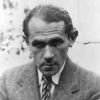Bruno Schulz

Bruno Schulz
Bruno Schulzwas a Polish writer, fine artist, literary critic and art teacher born to Jewish parents. He is regarded as one of the great Polish-language prose stylists of the 20th century. In 1938, he was awarded the Polish Academy of Literature's prestigious Golden Laurel award. Several of Schulz's works were lost in the Holocaust, including short stories from the early 1940s and his final, unfinished novel The Messiah. Schulz was shot and killed by a German Nazi in 1942 while...
NationalityPolish
ProfessionPoet
Date of Birth12 July 1892
CountryPoland
Theses officers were good friends, so it must have been a terrible argument, because the one who played chess with my father was so angry that he walked over to the dentist's house and got the dentist out of bed and shot him.
Even in the depths of sleep, in which he had to satisfy his need for protection and love by curling himself up into a trembling ball, he could not rid himself of the feeling of loneliness and homelessness.
The days hardened with cold and boredom like last year's loaves of bread. One began to cut them with blunt knives without appetite, with a lazy indifference.
...."the sound of a barrel organ rising from the deepest golden vein of the day; two or three bars of a chorus, played on a distant piano over and over again, melting in the sun on the white pavement, lost in the fire of high noon.
How can one not succumb and allow one's courage to fail when everything is shut tight, when all meaningful things are walled up, and when you constantly knock against bricks, as against the walls of a prison?
Animals! the object of insatiable interest, examples of the riddle of life, created, as it were, to reveal the human being to man himself, displaying his richness and complexity in a thousand kaleidoscopic possibilities, each of them brought to some curious end, to some characteristic exuberance.
Yet what is to be done with events that have no place of their own in time; events that have occurred too late, after the whole of time has been distributed, divided, and allotted; events that have been left in the cold, unregistered, hanging in the air, homeless, and errant?
Could it be that time is too narrow for all events? Could it happen that all the seats within time might have been sold? Worried, we run along the train of events, preparing ourselves for the journey.
Lifelessness is only a disguise behind which hide unknown forms of life.
Now the windows, blinded by the glare of the empty square, had fallen asleep. The balconies declared their emptiness to heaven; the open doorways smelt of coolness and wine.
My ideal goal is to "mature" into childhood. That would be genuine maturity.
This enraged the other Nazi so much that the next morning he came to our house and he shot my father.
Man was entering under false pretenses the sphere of incredible facilities, acquired too cheaply, below cost price, almost for nothing, and the disproportion between outlay and gain, the obvious fraud on nature, the excessive payment for a trick of genius, had to be offset by self-parody.
Ordinary facts are arranged within time, strung along its length as on a thread. There they have their antecedents and their consequences, which crowd tightly together and press hard one upon the other without any pause. This has its importance for any narrative, of which continuity and successiveness are the soul.